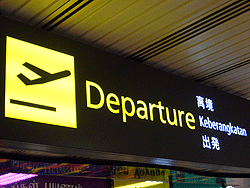A landmark report, Future Traveller Tribes 2020, has for the first time identified the major social, geopolitical, economic, consumer and technology trends that will determine who will be travelling in the future, which groups will potentially be most dominant and what their individual needs will be.
Cosmopolitan Commuters, Global Executives, Active Seniors and Global Clans are the four key groups expected to emerge in the next 10-15 years. The report, a joint study between Henley Centre HeadlightVision, an international futures consultancy, and Amadeus, provider of technology solutions to the travel industry, was developed following significant research and input from travel, airline and technology experts.

Cosmopolitan Commuters will use air travel to commute, the report says
“This breakthrough report, which has identified four groups, each with distinct needs, should help all of us consider how we can most effectively deliver new services,” said vice president, Airline Business Group, Amadeus, Frederic Spagnou.
Future Traveller Tribes 2020 analyses the impact of major international trends, such as the globalisation of business, politics, migration and tourism. These trends are considered alongside major consumer trends, such as growing environmental awareness and increased disposable income, to a greater demand for personalisation and a search for health and wellbeing. Putting these trends together, the report has identified four key traveller groups. These are:
1. Cosmopolitan Commuters: those that live in one city but work in another and will use air travel to commute;
2. Global Executives: ‘elite’ business travellers that want a private jet-type experience, predominantly from emerging economic markets such as Brazil, Russia, India and China, all of which will see significant growth in the next decade;
3. Active Seniors: the wealthy, healthy, older travellers, aged between 50 and 75, that will travel for cultural and leisure pursuits, driven by a growing ageing population;
4. Global Clans: people that will increasingly use air travel to visit extended family members, which will increase due to the explosion of international migration.
“For the first time, this report brings together major macro-trends, changes in consumer behaviour and technology developments to paint a realistic vision of what groups of traveller will emerge in the next 10-15 years. We hope it will have a significant impact on how travel services are delivered in the future. It is essential that travel providers start to think seriously about how the needs of the traveller will evolve and what can be done to secure customer loyalty,” said chief executive, Henley Centre HeadlightVision, Sian Davies.
“While the future is never certain, we hope that Future Traveller Tribes 2020 stimulates discussion across the industry about the future of travel. One thing is for certain, the traveller must remain the focus of the sector if we are to see ongoing growth and profitability,” added Spagnou.
Future Traveller Tribes 2020 also reveals that technology must increasingly respond intuitively to the traveller’s individual needs throughout their journey.
“The travellers of tomorrow will demand higher levels of control, comfort, security and personalisation from the travel experience, and the growing sophistication of information technology will underpin travel providers’ ability to deliver to these expectations, transforming the customer experience from booking to baggage collection,” the report stated.
Three key areas of technological development have been identified that will facilitate a more traveller-centric travel experience. Digital personal identities, based on easily accessible, up-to-date customer information, will make the provision of personalised service accessible to many travel providers.
An ability to offer travellers up-to-date, real time information when and where they need it via new communication technologies, such as mobile personal devices and the Internet, has the potential to streamline the journey.
The way in which customers are interacting with technology is also developing, and the increasing use of social computing and the growing sophistication of visual technologies may be harnessed by the travel industry to improve the travel experience.
The humanisation of technology, which will reinforce ease of use and responsiveness, will be seen throughout the entire travel process from booking, through check-in, in-flight and at baggage collection. Potential technology developments that support the concept of humanisation include, in the near term, SIM card identification, personalised destination information, mobile travel updates, digital concierges and, in the longer term, digital memories, 3-D glasses, RFID for both people and baggage, and humanoid check-in kiosks.
Scenarios that have been explored in the report range from travellers having the ability to conduct virtual reality ‘walk throughs’ to familiarise themselves with the airport before they leave home, to the use of 'sensing' technologies to tell if customers are anxious at check-in.
“The ‘humanisation of technology’ idea will hopefully result in a more simplified, intuitive and personal journey for all,” concluded Spagnou.
Previous: Switzerland, Austria most competitive in tourism
Next: US Airways selects Philadelphia for its proposed China service